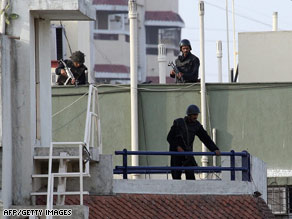Oil prices tumbled below US$40 for the first time since the summer of 2004 yesterday despite an announcement from Opec of a record production cut of 2.2 million barrels a day.
The drop shows that even the mighty Organisation of Petroleum Exporting Countries has little sway over a growing global recession, analysts said. Crude prices are down more than 72 per cent from their summer peak of US$147 a barrel, yet tankers continue to idle in the Gulf of Mexico and other ports waiting for buyers.
"There's just so much oil in inventory out there right now," said Michael Lynch, president of Strategic Energy & Economic Research. "Nobody wants to buy this stuff."
Markets had already priced in a vastly reduced flow of oil and traders focused instead on troubling economic data that points to a long and severe recession.
Light, sweet crude for January delivery tumbled 8 per cent, or US$3.54, to settle at US$40.06 on the New York Mercantile Exchange. Benchmark crude prices fell as low as US$39.88, a price last seen in July 2004.
Opec had already announced cuts totaling 2 million barrels earlier this year, also with little effect. The unprecedented production cuts and the market reaction show just how fast energy demand has fallen during the worst economic downturn in at least a generation.
"You've got a commodity that people are buying less of because they can't afford to buy more," said Phil Flynn, an analyst at Alaron Trading Corp. "People are fearful. They have a lack of confidence in the economy. They're closing their factories."
Lynch said global demand has slowed to its worst point since the early 1980s. Economists previously thought China and other developing countries were impervious to a global recession, he said.
"Now it's pretty clear that things are going to be bad everywhere," Lynch said.
US gasoline inventories continued to rise, the government reported, providing further evidence of a major pullback by American motorists.
Demand for gasoline over the four weeks ended Dec 12 was 2.7 per cent lower than a year earlier.
Grim economic news radiates out of the US, Europe and Asia almost daily as consumers and industries pull back on spending.
The Cooper Tire and Rubber Co said yesterday it will cut 1,300 jobs and close a plant in Georgia.
Newell Rubbermaid Inc is reducing its salaried work force by as much as 10 per cent. The Atlanta-based company slashed its fourth-quarter and full-year profit guidance yesterday.
In Detroit, General Motors Corp put the brakes on construction of an engine factory trying to hold on to the cash that it has left.
Meanwhile, the dollar suffered its biggest one-day decline against the euro after the Federal Reserve cut a key lending rate target to historic lows.
That would typically lead more investors into the crude market because oil is bought and sold in dollars and you can get more bang for the buck.
But investors in this harsh economic climate are holding onto their wallets like never before, betting there's not enough global demand to support higher crude prices, said Gene McGillian, an analyst at Tradition Energy.
"Oil prices should be a lot stronger," McGillian said.
The last time oil prices dipped below US$40 a barrel was on July 21, 2004. Prices settled that day at US$40.09, according to Peter Beutel, an oil analyst at Cameron Hanover.
Many analysts believe oil prices will continue falling next year with agencies ranging from the US Department of Energy to the International Energy Agency forecasting weak demand.
IHS Global Insight chief economist Nariman Behravesh was among the industry experts forecasting lower prices for oil.
"Oil prices will (easily) fall below US$40 per barrel in the next year, and could tumble all the way to US$30," Behravesh said in a research note. "With the economic outlook deteriorating by the day, futures markets for commodities have not priced in the full extent of the 'demand destruction' taking place."
Doubts also remain about the willingness of some Opec members to adhere to price-boosting production quotas.
"Opec has lacked credibility for a long time on discipline," said Gerard Rigby, energy analyst at Fuel First Consulting in Sydney. "Opec is going to have to show they are committed to the cut, that it's not just talk."
US crude inventories rose slightly last week despite expectations for a drop, while gasoline reserves increased as demand stayed below year-ago levels, according to government data released yesterday.
Analysts had expected a drop of 900,000 barrels, according to a survey by Platts, the energy information arm of McGraw-Hill Cos.
Gas prices, because it must be refined from crude, almost always lags the movement in oil prices.
Retail gas prices, which hit a low of US$1.656 a gallon on Friday, rose to US$1.667 a gallon yesterday, according to auto club AAA, the Oil Price Information Service and Wright Express. — AP


















